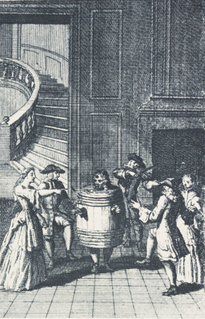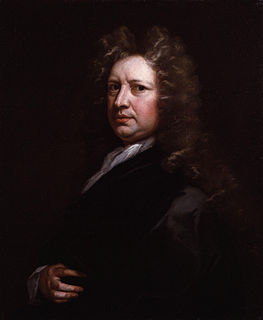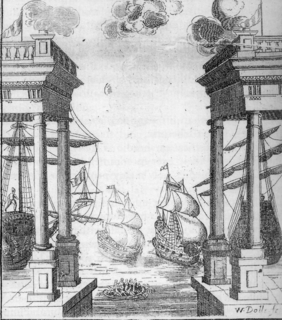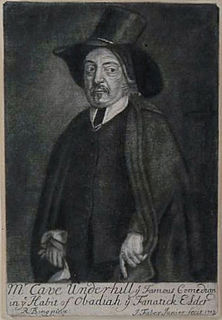
"Restoration comedy" is English comedy written and performed in the Restoration period of 1660–1710. Comedy of manners is used as a synonym for this. After public stage performances were banned for 18 years by the Puritan regime, reopening of the theatres in 1660 marked a renaissance of English drama. Sexually explicit language was encouraged by King Charles II (1660–1685) personally and by the rakish style of his court. Historian George Norman Clark argues:
The best-known fact about the Restoration drama is that it is immoral. The dramatists did not criticize the accepted morality about gambling, drink, love, and pleasure generally, or try, like the dramatists of our own time, to work out their own view of character and conduct. What they did was, according to their respective inclinations, to mock at all restraints. Some were gross, others delicately improper.... The dramatists did not merely say anything they liked: they also intended to glory in it and to shock those who did not like it.

Elizabeth Barry was an English actress of the Restoration period.

Thomas Patrick Betterton, the leading male actor and theatre manager during Restoration England, son of an under-cook to King Charles I, was born in London.

The Theatre Royal, Drury Lane, commonly known as Drury Lane, is a West End theatre and Grade I listed building in Covent Garden, London, England. The building faces Catherine Street and backs onto Drury Lane. The building is the most recent in a line of four theatres which were built at the same location, the earliest of which dated back to 1663, making it the oldest theatre site in London still in use. According to the author Peter Thomson, for its first two centuries, Drury Lane could "reasonably have claimed to be London's leading theatre". For most of that time, it was one of a handful of patent theatres, granted monopoly rights to the production of "legitimate" drama in London.
Christopher Rich (1657–1714) was a lawyer and theatrical manager in London in the late 17th and early 18th century.

The Restoration spectacular, also known as a machine play, was a type of theatre prevalent in the late 17th-century Restoration period. Spectaculars were elaborately staged, comprising such setups as action, music, dance, moveable scenery, baroque illusionistic painting, costumes, trapdoor tricks, "flying" actors, and fireworks. Although they were popular with contemporary audiences, spectaculars have endured a bad reputation as a vulgar contrast to the witty Restoration drama.
George Powell was a 17th-century London actor and playwright who was a member of the United Company. He was the son of the actor Martin Powell, a long-standing member of the King's Company.
The patent theatres were the theatres that were licensed to perform "spoken drama" after the Restoration of Charles II as King of England, Scotland and Ireland in 1660. Other theatres were prohibited from performing such "serious" drama, but were permitted to show comedy, pantomime or melodrama. Drama was also interspersed with singing or dancing, to prevent the whole being too serious or dramatic.

The Dorset Garden Theatre in London, built in 1671, was in its early years also known as the Duke of York's Theatre, or the Duke's Theatre. In 1685, King Charles II died and his brother, the Duke of York, was crowned as James II. When the Duke became King, the theatre became the Queen's Theatre in 1685, referring to James' second wife, Mary of Modena. The name remained when William III and Mary II came to the throne in 1689.
The King's Company was one of two enterprises granted the rights to mount theatrical productions in London, after the London theatre closure had been lifted at the start of the English Restoration. It existed from 1660 to 1682, when it merged with the Duke's Company to form the United Company.

Lisle's Tennis Court was a building off Portugal Street in Lincoln's Inn Fields in London. Originally built as a real tennis court, it was used as a playhouse during two periods, 1661–1674 and 1695–1705. During the early period, the theatre was called Lincoln's Inn Fields Playhouse, also known as The Duke's Playhouse, The New Theatre or The Opera. The building was demolished and replaced by a purpose-built theatre for a third period, 1714–1728. The tennis court theatre was the first public playhouse in London to feature the moveable scenery that would become a standard feature of Restoration theatres.

The Duke's Company was a theatre company chartered by King Charles II at the start of the Restoration era, 1660. Sir William Davenant was manager of the company under Prince James, Duke of York's patronage. During this period, theatres began to flourish again after being closed due to restrictions throughout the English Civil War and Interregnum. The Duke's Company existed from 1660 until 1682 when it merged with the King's Company to form the United Company.

Cave Underhill (1634–1710?) was an English actor in comedy roles.
Samuel Sandford was an English character actor, known for his roles as villains.

Letitia Cross was a British singer and actor. She appeared at the Drury Lane Theatre and was the mistress of Peter the Great when he visited England.
Joseph Williams was an English stage actor of the seventeenth and early eighteenth century.
Elizabeth Willis (c.1669-1739) was a British stage actress.
Elinor Leigh was a British stage actor of the seventeenth century.
Elizabeth Bowman was an English stage actor of the seventeenth and early eighteenth century. The daughter of Sir Francis Watson, 1st Baronet she was adopted by the actor manager Thomas Betterton. In 1692 she married John Bowman and began acting at Drury Lane the following year as Mrs Bowman. She was a member of the United Company until 1695 then joined Betterton's breakaway at the Lincoln's Inn Fields Theatre.
Marmaduke Watson was an English stage actor of the seventeenth century. Part of the King's Company based at the Theatre Royal, Drury Lane, he was one of the actors who sided with Charles Killigrew during a dispute in the company in 1677. In 1682 when the United Company was formed he left and went to Dublin to join the Smock Alley Theatre. He later returned to London where his final known performances were with Thomas Betterton's company at the Lincoln's Inn Fields Theatre.










